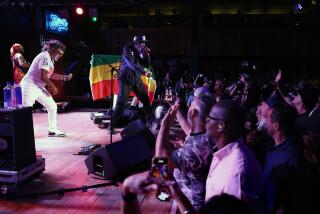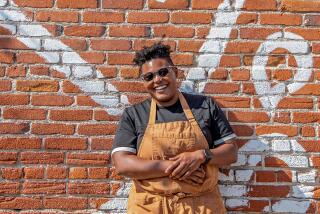Jazz echoes through the ribs of the Blue Whale
You never know where inspiration will strike. For 36-year-old jazz singer and Los Angeles club owner Joon Lee, it happened one night watching a documentary on blue whales.
“These guys are vanishing at people’s hands,” said Lee, who has long been fascinated by the improbable grace and mysterious “singing” of the gargantuan mammals. “And I was like ... that sounds like jazz!” he added with a mischievous laugh.
Three years later he opened the Blue Whale, a cozy and unconventional jazz club that in just 10 months has blossomed into one of the top spots for jazz in the city — although it can be nearly as hard to find in the open seas of downtown L.A. as its namesake.
Tucked away on the third floor of Little Tokyo’s Onizuka Plaza next to the taste bud-torching ramen shop Orochon, the Blue Whale doesn’t fit the typical mold of a jazz club. In place of cramped, tea-lit café tables, a dark blue flotilla of cushioned cubes and rectangles flows around the polished floor like some free-roaming Tetris game. The cover is generally a bargain-priced $10, there are no food or drink minimums and, most unusual, no bandstand in the pale gray, gallery-like performance space, which is intended both for intimacy and to allow musicians to set up anywhere in the room.
“The energy between musicians is amazing, and a great part of music, but when we have space between them and the audience, that part is always missing.” Lee said. “I wanted to make the audience play their part too.” Even a chalkboard at the front of the club has become a performance space of sorts, with renderings of John Coltrane and the up-close cover of Miles Davis’ “Tutu” appearing next to a rundown of the week’s upcoming shows thanks to a couple of artistically inclined customers.
In keeping with the in-the-moment spirit, there is no cocktail menu at the Blue Whale’s low, brushed-metal bar. Instead, crisply dressed bartender Mitch Heynen first asks for a spirit as a baseline and checks for any allergies, then, for example, shakes up an unnamed concoction made with gin, a splash of lychee juice and a sliver of lemon rind. Although such skills are consistent with L.A.’s current artisan cocktail craze, Heynen won’t be lumped in with any fussy “mixology” trend.
“This is a jazz club, period,” Heynen said flatly. “We’re all musicians here, whether you’re on that side of the bar or this one. It just always seemed appropriate to improvise.” A menu of Korean-inspired bar food is also available.
Also unique is the Blue Whale’s booking philosophy, which in addition to featuring locals such as Larry Koonse and Alan Broadbent also caters to younger players who may play outside the mainstream. This Saturday, versatile Bay Area drummer Scott Amendola brings a trio to the club armed with improvised electronic textures, and violinist-composer Miguel Atwood-Ferguson, who has collaborated with the avant-garde beat fusion of Flying Lotus, performs Oct. 30.
“In L.A. there are so many places where you can hear something traditional,” said Lee, who has performed at many local clubs since moving here from New York in 1997. “But there are so many great musicians that don’t get a chance to play what they want to play. Personally, I want to have not just younger guys but those guys who want to be out on the edge and try something new.”
As a result, the club has quickly become a musician’s favorite. Performing under the club’s massive, tablet-shaped copy of Rumi’s poem “Listening,” guitarist Anthony Wilson shows a deft hand with so-called tradition on the beautifully swinging “After the Flood” but also takes the young and enthusiastic crowd someplace darker and tougher to define, back-announcing one shape-shifting piece as “something we just made up.”
Jeff Olsen, a Riverside-based drummer in the audience, came to check out the Blue Whale based on a fellow musician’s recommendation. “He said, ‘It’s a cool place, but I can’t really explain it,’” Olsen said, looking around with a smile. “Now I see what he meant,” he added.
Still, given the economic realities of operating a jazz club in 2010, it’s hard not to worry for the Blue Whale’s future (as its name fairly acknowledges). The Jazz Bakery still hasn’t found a permanent home, and the Valley standby Spazio’s also recently closed after 12 years. In a sort of accidental tribute, the Blue Whale’s lipstick-red drum kit used to belong to the club.
Regardless, Lee refuses to complain. “Somebody needs to do it anyway,” he said, shrugging off any long-term fears. “And to be honest with you, we need to have like 20 more venues like this.”
Where: 123 Astronaut E. S Onizuka St., Suite 301, L.A.
When: Thu.-Sat., 8 p.m. to 2 a.m.; Sun. 6 p.m. to 12 a.m.; Mon. 9 p.m. to 2 a.m.
Price: $10 cover most nights. Beer, wine and cocktails $5 to $15; food $5 to $15
Contact: (213) 620-0908; https://www.bluewhalemusic.com
More to Read
The biggest entertainment stories
Get our big stories about Hollywood, film, television, music, arts, culture and more right in your inbox as soon as they publish.
You may occasionally receive promotional content from the Los Angeles Times.











